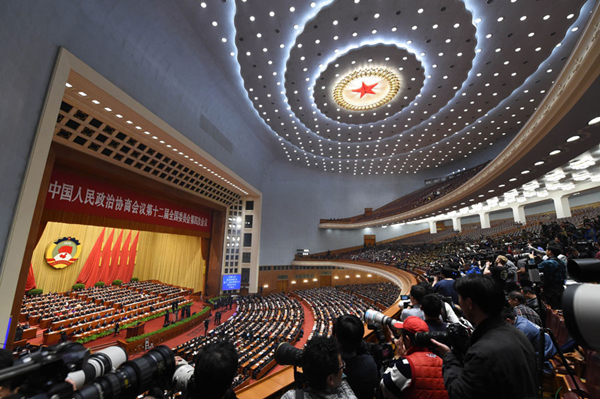China: reflections on national identity and resilience
- By Einar Tangen
 0 Comment(s)
0 Comment(s) Print
Print E-mail China.org.cn, March 4, 2016
E-mail China.org.cn, March 4, 2016
|
|
|
The fourth session of the 12th National Committee of the Chinese People's Political Consultative Conference (CPPCC), the national advisory body, opens at the Great Hall of the People in Beijing, capital of China, March 3, 2015. [Photo/Xinhua] |
As the meetings of NPC and CPPCC begin, China faces numerous challenges, economic headwinds, global political issues and cultural dilemmas; each has domestic, as well as international facets. The first two issues are covered daily in exhaustive detail, but solving China's cultural dilemmas may be, in the end, the key to the other issues.
Over the millennia, China's diaspora has reached every corner of the globe. During the declining years of the Qing Dynasty and the beginning of new China, Chinese workers, in vast numbers, sought opportunity in foreign lands. It was not an easy transition, as they were often met with hostility from locals, and brutal working and living conditions from their employers. Denied basic rights and therefore unable to defend themselves, they became the choice for exploitation, before and after slavery was abolished. They built the railroads in the America's and Asia, they took the place of slaves in Caribbean sugar plantations and provided the cheap labor, the expanding colonial powers needed to expand and run their empires.
With the rise of new China, Chinese at home and abroad, are having to adjust to a new perception of China, not as an over populated, decadent weakling, but a vibrant rising world power. But, like the ripples on a pond caused by pebbles and the wind, the reactions to China's fast changing status, has been far from simple or monolithic.
As the world rushes to learn Chinese and gage the opportunities and challenges presented by China's rise, the essence of what it means to be Chinese is in transition. From protests in the U.S. against the manslaughter conviction of a Chinese police officer, to domestic identity issues in Hong Kong, Taiwan, Xinjiang and Tibet, to a rising confidence of Chinese abroad that they will be protected, all are examples of how the essence of being Chinese is taking a new shape, both at home and abroad.
As stated, the issue of identity is far from simple or monolithic, but it is an essential piece of China's future. A strong shared identity is essential is to develop the kind of national social resilience, the glue, which can help it weather ever changing economic and political tides.






